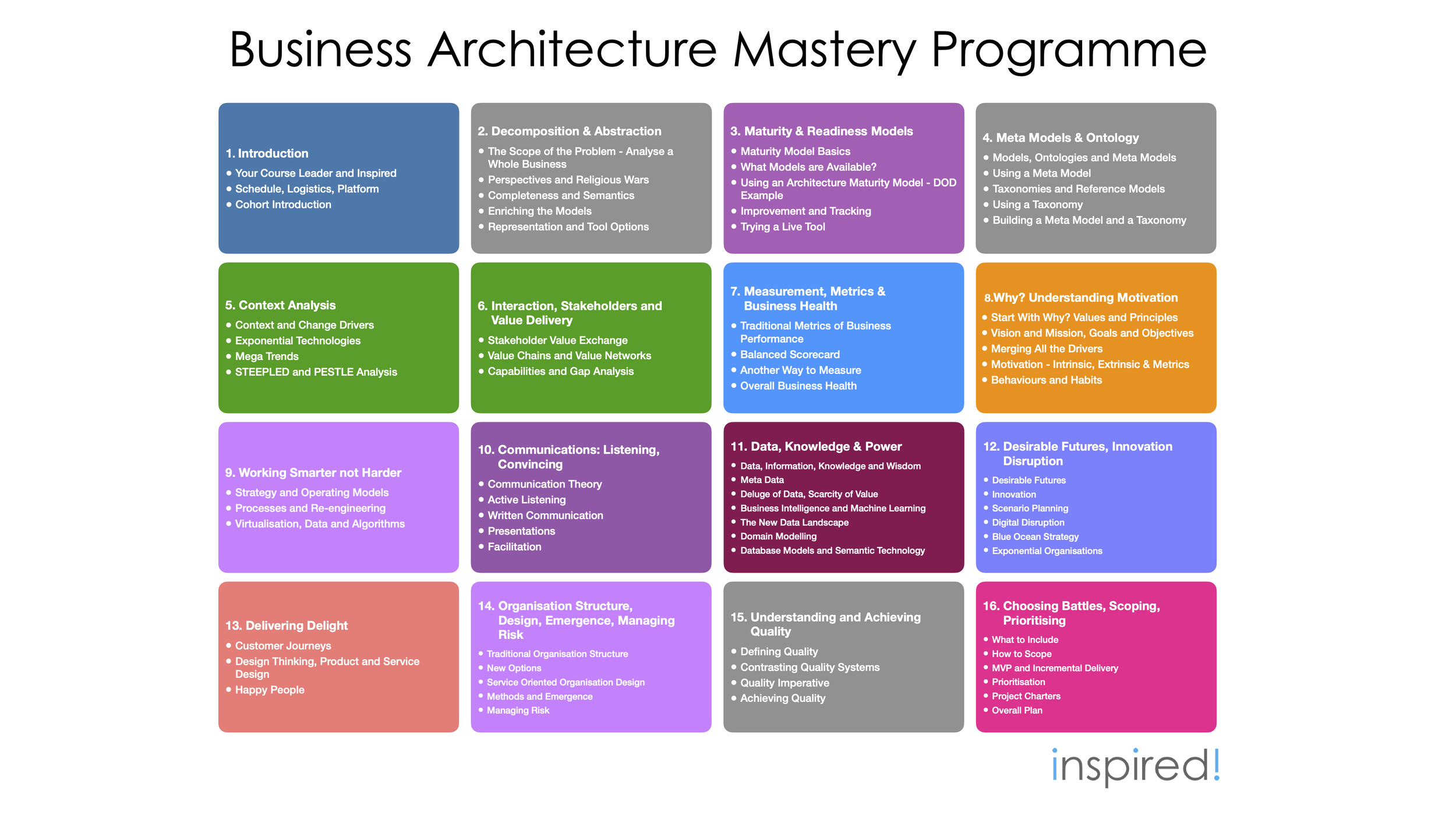Image: DEANLONG
Business Architecture Mastery
14h00 - 17h00 SAST / 12h00 - 15h00 UTC.
See schedule below for more detail.
Audience and Benefits
Senior business analysts, strategists and business architects often need to quickly and competently analyse a business (and its context) and make well founded recommendations for improvement/ transformation, convince stakeholders of their merits and transfer the ideas into implementation. Senior managers of Programme/ Project offices and directors of strategic change programmes need to define, scope, estimate and justify change initiatives and programmes.
This sixteen week intensive course provides you with the knowledge, skills and techniques to do the analysis, engage with stakeholders and present recommendations persuasively.
Transform your own capabilities, then your organisation or client.
Develop the skills to be at the table where strategic decisions are made.
Have a real positive impact on your organisation, industry, customers, other stakeholders and society at large.
Engage, grow and lead.
This is the most comprehensive Business Architecture training programme available globally. We go beyond approaches such as TOGAF™ (Open Group), Zachman, BizBoK (Business Architecture Guild), Business Model Canvas (Osterwalder & Pigneur), Enterprise Engineering (Dietz et al), Archimate™ (Open Group) and others in addressing the context in which business finds itself and the many dimensions that must be integrated to make informed coherent decisions to achieve desirable futures. We draw upon and remain compatible with other approaches where these are competent and deliver value, but supplement these with unique thought leadership in integrated meta models, stakeholder modelling, process architectures, integration of strategy, architecture and programme management.
Engage thoroughly with business executives in a way that they appreciate
Rapidly identify the real strategic issues
Exploit change and emerging technology to your advantage instead of suffering its effects
Become a valued change agent in your organisation and industry
Understand powerful meta skills that you can apply in countless situations, techniques and throughout your career
We launched the programme in 2021 after a successful pilot in 2020. These confirmed the efficacy of the delivery model and the relevance of the techniques. The full programme comprises 15 major topics, focussing on one per week. All sessions feature live instruction, online delivery, supplemental recordings and written material.
Vital insights into how technology, society and business are changing
State of the art techniques for strategy, business architecture, enterprise analysis and digital transformation
Integrated approach that merges disciplines and concerns to create holistic results
Leverage industry and expert knowledge in reaching analysis conclusions and making recommendations
Why Inspired?
Delegates will benefit from the expertise of the course leader and his team at Inspired. The course will be led by Graham McLeod, Owner and Chief Architect of Inspired.org. Graham has worked in industry for 40 years and academia for 12 (in parallel). He has experienced first hand the difficulties of really doing thorough analysis under pressure in many industries globally, including banking, assurance, healthcare, telecoms, education, administration, retail, services and others. He has taught strategy, business and enterprise architecture and other techniques at leading universities and international conferences. He has led the development of unique techniques, models and tools at Inspired for over two decades. He is uniquely qualified to share experience and techniques that you can rapidly apply. He is passionate about his subject and a great teacher. We may also have expert guest lecturers on selected topics. These are carefully chosen to ensure high levels of expertise and stimulating delivery.
Inspired Holistic Architecture Language Vsn 2.0 Top Level Executive View
Unique content shared will include:
Inspired Holistic Architecture Language overview and conceptual meta model
Inspired techniques for reconciling motivation, function, process, service and capability dimensions
Inspired maturity models for Application Landscape and Post COVID New Normal
Inspired Process Architecture approach
Inspired Stakeholder Value Exchange techniques
Innovative Initiative selection, scoping and prioritising techniques
Insights on how to present recommendations and models in ways that are persuasive to decision makers
Comments from Delegates on Previous Courses
““TOGAF might give you the roadmap, this teaches you how to drive”
“Great to finally understand how to do it”
“Multiple perspectives well explained. Now we can stop arguing over whether SOA or Process Modeling is the ‘right’ way - they are sides of the same coin”
“My head is full - in a good way”
“Gives me confidence to work with senior managers - can now talk business and draw the picture”
“Design thinking holds great promise for innovative solutions”
“Excellent and dynamically presented. Thanks!”
”Coverage of current and advanced topics lends real perspective””
Testimonials
Robert McKee
20+ Year Business Architecture veteran Major banking group
“Having participated in the above-mentioned course under the auspices of Inspired.org during Feb-June 2021 I can unreservedly say that it was one of the most encompassing courses on Business Architecture that I have had the privilege to attend.
Graham McLeod who is the owner and Chief architect at Inspired.org facilitated the course at a pace that ensured that no-one was left behind and allowed sufficient time for students to engage in breakaway sessions to ensure that there was a cross pollination of ideas and solutions during exercises.
The course material was well thought through, illustrated by good examples, and a comprehensive text was made available as a useful resource after the course was completed.
Content was produced with all levels of participants in mind and ensured that no matter what your current experience level was, that you would derive value from attendance.
I would recommend the course as a superb source of insights into modern day business architecture, and to place you in a position to take advantage of opportunities in this field.
The establishment of a forum for ongoing networking and enrichment on relevant topics is a supplementary benefit post course.”
Sabelo Mabanga
Newly minted business architect at leading multinational retail group
”…it was my first Business Architecture course, I got what I was bargaining for and more… I’m in it, I’m inspired…”
Damian Gawlowski
Business Architecture and Design Lead at Deloitte, London UK
“I recently completed the Business Architecture Masterclass (BAMC) administered by Inspired Consulting and presented by Graham McLeod... The course was well managed with materials at a similar quality to that of Oxford University. Sessions were also run in a similar fashion where there was a mix of lecture, discussion and break out rooms for group exercises…
The BAMC has certainly been one of the more useful courses that I have attended in that the spectrum of content presented is far broader than I would have expected... The subjects covered extend beyond the traditional content that you would expect - to starting to think outside the box, different perspectives, what matters to the design of a business and its people…
This course is a great option to solidify basic Business Architecture training already completed. It goes beyond the Business Architecture Guild’s BIZBOK guide and the Zachmann Framework Masterclasses that I have done. If you are looking for a course that will introduce you to some of the latest research in this field and beyond, I would highly recommend this course.”
Content and Structure
The course features Live TED-like lectures, in-class assignments, group work and feedback to apply techniques. Sessions are recorded for ease of review / in case you miss anything. Supporting notes, documents, examples and videos are provided to enhance learning. Support in planning the use of techniques in your own context is included.
Certification requires 12 modules out of 16 to be completed.
The main topics covered in the course include (subject to improvement without notice):
Analysing a Business using decomposition, abstraction and multiple perspectives. Applying decomposition and abstraction in a variety of relevant model types, including: Motivation/Goals, Function, Process, Service, Capability
Use of Maturity/Readiness Models
Understanding, constructing and applying maturity models to rapidly assess status and plan next steps for positive change. These can apply to the business/social context, EA practice, Business Architecture Capability, Digital Transformation and other areasOntologies, Taxonomies and Meta Models
Understand the role and structure of meta models and how business ontologies and industry reference models provide guidance for analysis and integration of information. Learn how they can be used to rapidly analyse current business / situation and identify gaps, redundancies and opportunities. Learn how they can be employed to integrate multiple perspectives and support collaborationContext Analysis
Understanding the context in which the business operates is vital to making sound decisions. This includes understanding inter alia: Technology, politics, economy, competition and other factors driving change; impact of change on options, data, products, services, employment, organisation structure, nature of work, business models, channels and customer engagement
Interaction and Stakeholders
This is about seeing the organisation from the outside and the perspective of customers, suppliers, legislators, employees and other stakeholders. We need to understand why and how we engage with these parties and what each provides and expectsMeasurement, Metrics and Business Health
We tend to get what we measure, so it is very important to understand how to measure holistically: measure things that really matter and drive desired behaviour and outcomes in a sustainable manner. We also need to assess and enhance the overall health of the organisation
Understanding and Delivering Value
Ultimately, an enterprise exists to add value to customers, shareholders, employees, partners and other stakeholders, including society at large. We need to understand value from stakeholder perspectives, how it is created and how to enhance its delivery through capabilities. Extended value chains and networks beyond single organisations also receive attention
Working Smarter not Harder
The use of data, ubiquitous intelligence, pervasive networks, location awareness, algorithms and machine learning can transform business models, value chains, processes, products and services and, ultimately, value delivery. Having a shared conceptual language and vocabulary enhances communication and rigour in all modelling and requirements definition activities
Communications: Listening, Convincing
Really listening and gathering accurate inputs to decision making is vital. Facilitation and consensus building are important sills. So are formulating recommendations, plans, designs and architectures in a way that is accessible and persuasive to decision makers and affected stakeholders
Data, Knowledge and Power
Data, information, knowledge and wisdom are increasingly available and important. We need to understand what they are, how we gather them, how we organise them, exploit them and integrate them for best effect
Organisation Structure, Design, Emergence
How organisations come to have the shape they do. Understanding new possibilities and what is appropriate to respond to challenges and opportunities while respecting the human aspects and good cultures. Supporting agency (self management) while achieving high performance. Working with organisation design to achieve a match for future business structures. The role of change management in success
Desirable Futures
This is about imagining the possible, which is normally well beyond what most people plan for. Development of visions for business, products, services, delivery, customer interaction. Scenarios and prototyping
Understanding and Achieving Quality
When we make change, it should create something better. Understanding quality, quality measurement, quality achievement and quality improvement is vital to delivering plans and architectures that enhance the business, the experience of stakeholders and value to the community
Why? Understanding Motivation
Understanding the many reasons we do things, the many reasons we may need to change. Merging these drivers. Identifying themes and priorities. Setting realistic goals and objectives and tracking activity to respond to desired outcomes and imperative changes
Innovation and Disruption
Much is made of digital disruption and how various organisations have used technology to win in their markets. However, the truth is that digital disruption is mostly about people and change. We can introduce technology, but we have to use it in ways that benefit people and we have to manage the impact so that we convince those affected of its benefits. Also, how do we foster creativity and leverage it internally and externally?
Delivering Delight
How to engineer delight into products, services and customer experience. How to keep doing it. How to be a great place to work while delivering value sustainably
Managing Risk
Understanding, identifying, reducing, and appropriately taking risk
Choosing Battles, Scoping, Prioritising
Filtering options, properly scoping initiatives, focussing resources and executing in the right sequence. The role of minimum viable products and incremental delivery
Certification
Delegates may do an optional examination following attendance of the course, scheduled at mutual convenience. This is charged at R3 003 plus VAT (US $191). Those passing the exam will be certified as Inspired Business Architects (Probationary).
Probationary qualification can be upgraded to Certified following:
- Submission of a portfolio of business architecture deliverables produced
- Interview with respect to business architecture knowledge and application
These follow up activities are included in the examination fee.
Live Sessions
The course will start with a 3-hour introductory session. This will cover:
- Delegate introduction
- Lecturer(s) and course introduction
- Lecturer(s) and course introduction
- Overview of logistics and technology with opportunity to test
- Issue of reading and pre-work for first topic session
This will be followed by fifteen instructor led sessions of 3 hours each, 1 per week. Each session will have a similar structure, viz.:
- Introduction to the topic via a TED-Style lecture
- Individual exercise to apply techniques and clarify understanding
- Group work assignment to apply technique to a case study
- Presentation and review of group work to enrich learning
- Optionally: Use of short video to set the scene/ enhance learning / provide richness
- Time permitting: enrichment via presentation of real world examples and pro tips
The course will conclude with a session including:
- Review of learning
- Suggestions for improvement
- Planning use of new knowledge in delegate organisations
Sessions are recorded for ease of review / in case you miss anything.
Session Schedule
Live sessions are held every Thursday at the times shown below (This may change to accommodate most convenient times for cohort actually enrolled):
| Session | Suitable for | UTC Universal Coordinated Time |
SAST/CAT South Africa, Central Africa |
CEST Central Europe |
BST United Kingdom |
EST Eastern USA |
PDT Western USA |
| 1 | USA, Canada, South America (AM) | 12h00 - 15h00 | 14h00 - 17h00 | 14h00 - 17h00 | 13h00 - 16h00 | 08h00 - 11h00 | 05h00 - 08h00 |
| Europe, UK, Africa, Middle East (PM) |
Platform
To support learning, we use the Ruzuku course delivery platform. This allows us to provide course overviews, online enrolment and payment, online course structure and progress tracking, forums for student collaboration, recorded session videos and support materials such as white papers, readings, example models and video clips.
We make use of Zoom for live lectures with rich student interaction via video, audio, screen sharing, break-away rooms and chat facilities. Students will need a PC / Mac / high end tablet and a reliable Internet connection to participate.
We will share examples in our enterprise level enterprise modelling and knowledge management platform: Enterprise Value Architect (EVA) to demonstrate what an integrated tooling environment can achieve. Of course, techniques can also be supported by other competent toolsets.
Pricing and Enrolment
Because of the high level of engagement and lecturer attention, we are limiting the course to a maximum of 24 delegates per cohort.
Being based in a developing economy region (South Africa) we are acutely aware of the difficulty of paying for world class tuition in devalued currency. Accordingly we have two tier pricing for the course:
| Location | Cost (before taxes) |
|---|---|
| Developing Economies | ZAR 31 122 / USD 2 129 |
| Developed Economies | USD 2 937 |
If you are unsure of your current economy’s status, please refer to the full country lists.
Both of these provide exceptional value when you consider the career development and improved strategic decisions that result.
Apply Now
Current scheduled instances below. Please choose one to reserve your place.
Please contact us if you want to arrange an in-person or in-house course and we will review the request.
Still Have Questions?
Please use the form below to ask us anything or have us contact you for a discussion. Not sure whether this training is suited to your role/organisation/experience? Book a call and we can discuss further, and find the right match for your needs.














